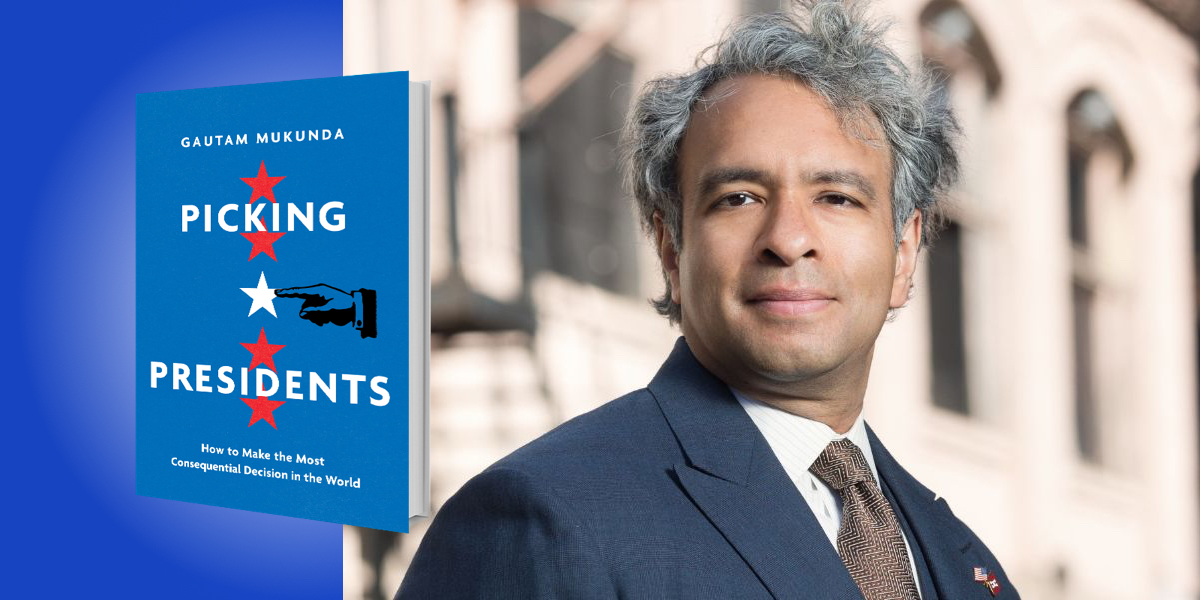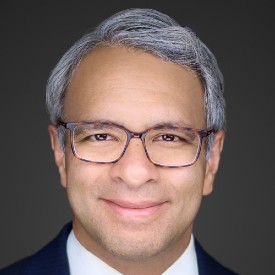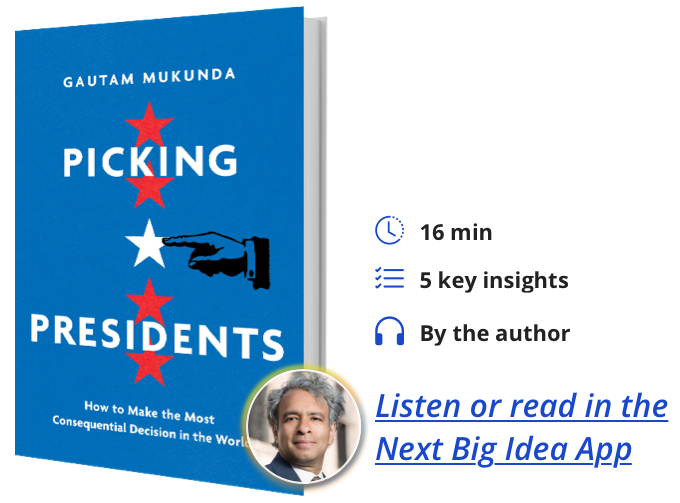Gautam Mukunda is a Research Fellow at the Harvard Kennedy School’s Center for Public Leadership. He has been a professor at both Harvard Business School and Tsinghua University. He is also the host of Nasdaq’s podcast World Reimagined. His writing has been published in Harvard Business Review, Foreign Policy, Security Studies, Slate, Fast Company, and Parameters. Among these and his many other accomplishments, he was also a Jeopardy champion.
Below, Gautam shares 5 key insights from his new book, Picking Presidents: How to Make the Most Consequential Decision in the World. Listen to the audio version—read by Gautam himself—in the Next Big Idea App.
1. There are two kinds of Presidents—and leaders.
And I don’t mean good ones and bad ones. The funny thing about leaders is that most of them don’t matter much because the leaders of big organizations usually aren’t chosen randomly. They are the product of a process. When organizations select a leader, they typically have a pool of candidates which they evaluate closely. In a big organization this can take years, or decades. This evaluative process eliminates outlier candidates, leaving the pool more and more homogenous until the final few are so similar that it doesn’t really matter which one is chosen.
I call leaders who rise through this sort of process filtered. Filtered leaders (Presidents included) tend to be competent but unexceptional. Good but not great. You won’t get someone who transforms a country, but you can be confident that they will rarely make avoidable mistakes and can do very well if dealt a strong hand. Think Tim Cook at Apple, or, in politics, George H.W. Bush. Who’s the most filtered President ever? It’s Joe Biden, who spent 44 years in either the Senate or the Vice Presidency before he was elected—twenty more years of filtration than the two Presidents tied for second place.
Most leaders get their jobs through extended filtration. Suppose a CEO gets hired from outside or inherits the job, however—that person bypassed the filtration process. Such leaders are unfiltered, and they haven’t been thoroughly evaluated and homogenized. Meaning, they can be very different from everyone else who might have gotten the job and therefore they make unique choices.
The thing about unique choices, though, is that they tend to be either great or awful, and are rarely boring. Think Steve Jobs, who did things that no other CEO would have ever imagined. That’s the best case, but most of the time unique decisions don’t work. If no one else in the world would do what you’re about to, there’s probably a good reason. Who’s the most unfiltered President ever? It’s Donald Trump, who was the first President ever to have not even spent one day in the government before taking charge of it.
2. Huge swings in history can be produced by the tiniest things.
The difference between a great President and a disastrous one can be a matter of inches—literally. Historians remember Harry Truman as one of the best Presidents. He was a long-time Senator who, as President, created NATO and the Marshall Plan, led the United States out of World War II and into the Korean War, and desegregated the military. He was chosen as Vice President by Democratic Party leaders who knew that Franklin Roosevelt would never survive his fourth term in office. They wanted to replace his previous Vice President, Henry Wallace, with someone they knew and trusted. That’s the essence of filtration.
“He was literally a single step from the podium, where he could have nominated Wallace and overridden party leaders.”
It was important to replace the incumbent Vice President partly because they felt that Wallace would have been a handicap in the 1944 Presidential election. They felt Wallace was too far Left—in particular, that he was too sympathetic to the Soviet Union. Wallace had once said that he wanted Harry Dexter White, the architect of the post-war monetary system, to be his Secretary of the Treasury. Unfortunately, thanks to decrypted Soviet messages, we know that White was almost certainly a Soviet spy. Wallace was wrong about the Soviet Union—something he said himself in 1952, when he wrote an article titled, “Where I Was Wrong.”
President Wallace could have been a disaster, and it almost happened. He was popular with the delegates to the 1944 Democratic convention and fought hard to stay on the ticket. Right after FDR was renominated, his campaign team surprised the party establishment by unleashing banners, coordinated chants, and having the Wallace campaign song played by the convention’s organist, whipping the delegates into a pro-Wallace frenzy. Florida Senator Claude Pepper, a leader of the Wallace campaign, stormed the stage. He was literally a single step from the podium, where he could have nominated Wallace and overridden party leaders. Just one step.
At that climactic moment, desperate party leaders shut down the convention by claiming a fire code violation and they sent a man with an axe to shut down the organ. Overnight, the party put to work the full arsenal of arm twisting and inducements, pressuring delegates into supporting Truman. History hinged on just one step.
3. Filtered leaders are great bets—unless the system is completely broken.
Filtered Presidents usually succeed. Most historians’ pick for the worst President in American history is James Buchanan, the last President before the Civil War. It’s hard to have a worse outcome for your Presidency than a Civil War. Yet, Buchanan was the second-most experienced and filtered person ever elected President. Filtered systems pick known quantities, which works, unless the system is selecting for failure.
In the lead up to the Civil War, Southern interests seized control of the Democratic Party’s presidential nominating process. Winning the nomination required at least two-thirds of the delegates, which made it mathematically impossible to get it without Southern support. Southern leaders took advantage of their power to constantly increase their demands. By the 1850s, they had adopted a pro-slavery position. They refused to support any candidate who did not agree, resulting in the election of “doughfaces”—Northern men with Southern principles.
“Filtered systems pick known quantities, which works, unless the system is selecting for failure.”
Buchanan was the ultimate doughface. He spent his entire, incredibly long, political career scorning the anti-slavery movement and giving the South everything. Once in office, he did what he had been elected to do: He unconstitutionally intervened in Supreme Court discussions to support the Dred Scott decision that declared the government had no power to ban slavery. He also aggravated the guerrilla fighting in Kansas which presaged the Civil War by supporting Southern insurgents there. When Southern states began to secede, Buchanan declared that he had no power to stop them. Sitting on your hands while a Civil War begins is a great way to be remembered as the worst President, but the irony is that this is exactly why he was President in the first place. If he had done anything else, he would never have become President. You can rely on filtered leaders right up until the whole system is broken.
4. The worst Presidents could have been avoided.
A broken system means almost inevitable disaster. The worst leadership failures, though, are the avoidable ones. Unfiltered leaders can fail catastrophically, often for similar reasons. Failed unfiltered leaders have psychological traits like the “Dark Triad”—narcissism, Machiavellianism, and psychopathy.
These traits make someone more impressive on first encounter than they deserve to be. The first time you meet a narcissist, you’re likely to find them extraordinary. Over the long run, you’ll tire of them and if they’re in a leadership role, they’ll usually fail. Catastrophic unfiltered leaders often have other medical issues, like alcoholism and drug addictions. They often have radical and simplistic ideologies that offer, as H.L. Mencken once said, “a well-known solution to every human problem—neat, plausible, and wrong.”
How does James Buchanan’s only real contender for the title of worst President stack up? That’s Andrew Johnson, Lincoln’s second Vice President, who became President when Lincoln was assassinated. Lincoln picked him to gain support from pro-war Democrats in the 1864 election because Johnson was the only Southern Senator to stay with the Union. This initially gave Northern leaders, including Frederick Douglass, hope that he would carry on with Lincoln’s policies. Sadly, they were horribly disappointed.
Johnson grew up poor in the South. He was an alcoholic who was embarrassingly drunk at his own inauguration, and decided that freed Blacks, Northerners, and rich Southern whites were conspiring to oppress the poor Southern whites with whom he still identified. Once he became President, he dedicated himself to restoring the South’s pre-war social structure. Before Johnson became President, the defeated South had been willing to go along with civil rights for Black Americans. But Johnson’s support for Jim Crow made Southern whites hope that they could still win the peace. Over the next few decades, they rolled back virtually all the progress made because of the war. The first two Black senators were elected in 1870 and 1875. The third had to wait almost a hundred years, until 1967. Black Americans had more civil rights in 1867 than they did in 1957. It didn’t have to happen that way. It happened because of Andrew Johnson. One disastrous unfiltered President set the course of Civil Rights in America back by a century.
5. The very best leaders combine intellectual brilliance with managerial skill.
Unfiltered leaders can also be great. Just like Andrew Johnson, Theodore Roosevelt became President via assassination. He was made Vice President against his own wishes because Republican elites wanted to remove him as Governor of New York and put him in a place where he could do no harm…the Vice Presidency. Only Mark Hanna, the most powerful party boss of his day, opposed TR’s nomination, warning that “there’s only one life between this madman and the Presidency.” Hanna’s prophecy came true when William McKinley was assassinated, making Roosevelt the youngest-ever President.
“The trait that best predicts leadership success is something [psychologist Dean Simonton] called Intellectual Brilliance, which combines pure intellect with curiosity, sophistication, and inventiveness.”
He transformed the country as few ever have, from building the Panama Canal to enforcing the Sherman Antitrust Act, fighting corruption, strengthening the regulation of railroads, food, and drugs, and putting more than 230 million acres of public land under federal protection. If your kids have a Teddy bear, even those are named after Roosevelt, from a bear cub that he refused to kill during one of his hunting expeditions.
The extraordinary psychologist of performance Dean Simonton found that the trait that best predicts leadership success is something he called Intellectual Brilliance, which combines pure intellect with curiosity, sophistication, and inventiveness. Seen in that light, it’s not a surprise that Lincoln is the only President with a patent. Theodore Roosevelt wrote 12 books—several acknowledged as all-time classics—before he became President. He was, famously, “equally at home with experts in naval strategy, forestry, Greek drama, cowpunching, metaphysics, protective coloration, and football techniques.”
Another key hallmark of successful unfiltered leaders is a high level of managerial skill. Despite his youth, before becoming Vice President, Theodore Roosevelt had been a successful Civil Service and New York City Police Commissioner, Assistant Secretary of the Navy, Governor of New York, and, Colonel of the Rough Riders during the Spanish-American War. It’s hard to imagine someone more likely to succeed in the Presidency, no matter how unfiltered he was.
Leaders—particularly Presidents—can change the world, for better and for worse. Far too often the difference between an awful President and a great one has been a matter of chance. The Presidency is too important for us to keep relying on luck. If we do a better job of picking presidents and other leaders, then there’s no limit to the country—and world—we can make.
To listen to the audio version read by author Gautam Mukunda, download the Next Big Idea App today:

































